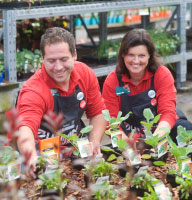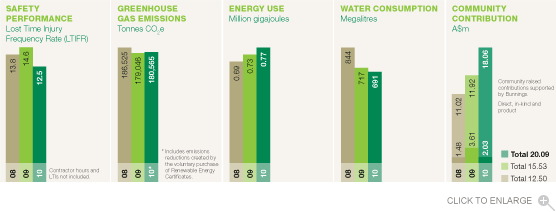About our business
Bunnings is the leading retailer of home improvement and outdoor living products in Australia and New Zealand and a major supplier of building materials.
Operating from a network of large warehouse stores, smaller format stores, trade centres and frame and truss manufacturing sites, we cater for do-it-yourself (DIY) customers as well as builders and contractors.
Revenue during the year was 6.4 billion dollars. At year-end there were 184 warehouses, 58 smaller format stores, 29 trade centres and seven frame and truss operating across Australia and New Zealand. At 30 June 2010 we employed 29,603 team members.

Year in review
During the year we continued to accelerate long-term footprint reduction initiatives including efforts to reduce energy usage and waste to landfill.
We continued to install energy efficient e-tronic lighting technology, with more than 60 stores now completed. We also implemented trials in solar and wind micro-generation at warehouse stores in WA and ACT and heat reflective roof treatment at the Townsville warehouse store in Qld.
We increased our recycling rate for all materials from 50 per cent to 61 per cent in Australian stores and are seeing early signs of improvement in our New Zealand stores with an increase from 32 per cent to 36 per cent this year.
We reduced our total scheme water use from an estimated 717 megalitres to 691 megalitres through the use of rainwater tanks and our ongoing commitment to hand-watering and capillary mats in our nurseries.
We also made real progress on our timber procurement in Australia and can now confirm that more than 99 per cent of timber products purchased are sourced from low risk plantation or other verified legal or sustainable forest operations.
Our range of sustainable products and information for customers also increased both in-store and online and we have further grown our community support through more team member led community projects, product contributions and fundraising sausage sizzles to assist the communities in which our stores operate.
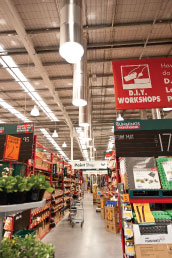
Solatube trial lights inside the Belconnen warehouse (ACT).
2010/2011 Priorities/Outcomes
| 2010 Priorities | Outcomes | Status | 2011 Priorities |
|---|---|---|---|
| Achieve carbon neutrality by 2015 or earlier | Total carbon footprint increased by approximately one per cent, significantly lower than net site growth of seven per cent. Actual carbon intensity of our operations continued to reduce by a further 9.7 per cent mainly through multiple energy and waste efficiency actions. |
|
|
| Implement more water saving initiatives | Achieved an eight per cent reduction in water use in New Zealand based stores and a 3.6 per cent reduction in Australian based stores through continued rainwater collection and innovative nursery irrigation techniques. | ||
| Increase work in-store and with suppliers to reduce supply chain resource waste, increase recycling rates and bring to market products with stronger sustainability traits | In Australia, more than 99 per cent of timber products purchased from low risk plantation, or other verified legal or certified sustainable forest operations. FSC certified product purchases reached 30 per cent. Increased recycling rates across the business with focus on product level packaging improvements and waste reduction in our supply chain. Expanded sustainable product ranges for customers. | ||
| Continue providing customers with access to information about environmentally-friendly products and projects that can support sustainable living | Increased customer access to information through our website with additional DIY videos, in-store information, catalogues and DIY workshops. | ||
| Maintain our contributions to improve the social wellbeing of the communities in which we operate | Contributed and helped raise more than $20 million in direct donations, in kind support, and team member labour toward community projects. | ||
| Reduce our All Injury Frequency Rate (AIFR) by 15 per cent through refreshed training, increased safety awareness levels, strengthened reporting and management systems all focused on high risk areas | 16.1 per cent reduction in AIFR achieved. Significant reductions in injuries, serious incidents and forklift incidents also achieved. |
KEY
![]() Achieved
Achieved
![]() Partially achieved
Partially achieved
![]() Not achieved
Not achieved
Performance charts
People
Our team members are the most important part of our business and their wellbeing and safety is a primary focus. Our safety performance has improved over the year and in 2010 we achieved our best safety result on record. We have had 161 less injuries (11.1 per cent improvement), 48 less serious incidents (42.8 per cent improvement), 37 less forklift incidents (22.4 per cent improvement) and our AIFR has reduced from 42.8 down to 35.9 (16.1 per cent improvement).
These reductions are a result of targeted safety campaigns and risk control initiatives focusing on high risk activities such as cutting, manual handling and forklift activity. Our permanent team member retention rate has reached close to 80 per cent which has also contributed to the effectiveness of our safety behaviour and training.
Some of the key programs that were launched last year include:
- Increased safety awareness through targeted campaigns which focus on ‘safer choices’
- Development and roll-out of a new safety film called ‘The BSAFE Wheel of Choice’
- Return to work organisers trained and appointed in all stores
- Online incident reporting system launched to replace the old paper based system
- Team member health assessments trialled with a broader roll-out planned for next year
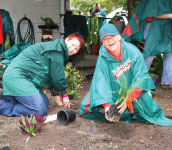
Actively participating in the local communities in which we operate is integral to all of Bunnings’ community involvement activities.
Environment
Our commitment to reducing our environmental impact includes energy efficiency measures, water conservation, responsible sourcing and packaging waste reduction.
It also includes a consistent focus on sustainable timber procurement which has led to substantial advancements in ensuring that all timber and wood products come from legal and well-managed sources.
Our websites www.bunnings.com.au and www.bunnings.co.nz contain comprehensive resources including water and energy saving information. The websites aim to be effective tools to engage customers on reducing their environmental impact through sustainable living and product choices.
Water
Scheme water usage is estimated to be 690.7 mega litres, with Australian based stores consumption down 3.6 per cent and New Zealand based stores down eight per cent on last year. This was achieved through a combination of measures targeting our nurseries, including a continued roll-out of rainwater harvesting tanks and capillary mats, and our ongoing commitment to hand-watering where appropriate.
Reducing waste and recycling
Our recycling rate continued to improve in our Australian based stores, increasing from 50 per cent to 61 per cent by volume with our New Zealand based stores increasing from 32 per cent to 36 per cent by volume. We estimate that 8,886 tonnes of cardboard and paper and 618 tonnes of plastics were recycled during the year and we disposed of 17,936 tonnes of waste to landfill.
We increased our focus on recycling in all Australian stores and set a benchmark target of 85 per cent diversion rate for the 2010/11 financial year. This is supported by an online recycling analysis report to enable benchmarking comparisons between locations.
Packaging
We continue to drive increased engagement from our suppliers on overall packaging reduction as well as use of recycled content. In February 2010 a packaging survey was conducted with team members to collect data on the type of packaging stocked in-store and product packaging levels. The survey results, which reinforced the need to minimise packaging, will drive further actions in this area into 2011.
Ethical sourcing and product stewardship
We have commenced a program to engage with a selection of major suppliers to collectively share experiences in identifying eco-efficient opportunities and risks in relation to energy, waste, water, packaging and ethical sourcing.
We continued our comprehensive factory accreditation program for products we directly import, where major overseas factories are audited to a code of conduct based on the ILO conventions. Part of this process requires factories to be visited and inspected by an independent auditor, our agents or our buyers. During the year a total of 139 audits were conducted representing 40 per cent of our total imported product purchases.
Our Timber and Wood Products Purchasing Policy was introduced in 2003 with the goal of ensuring that all timber and wood products supplied to us originate from verified legal or certified sustainable forest operations.
We have a zero tolerance to illegal timber and have worked closely with our suppliers in order to establish a condition of supply that requires independent verification of legal origin as a minimum for all productsmade completely from tropical hardwoods.
In Australia approximately 99 per cent of our timber products are now sourced from lower risk plantations or other verified legal or certified sustainable forest operations. Over 72.5 per cent of our timber products are from certified sustainable sources including more than 30 per cent of our sources that are FSC certified.
Our New Zealand operation is an active long-term member of the Imported Tropical Timber Group, an industry association working collaboratively with the government and environmental organisations to encourage sustainable timber procurement. In November 2009 our Papakura store achieved FSC Chain of Custody (CoC) certification for the supply oftimber and wood related products. This certification is supporting our major trade customers and builders to promote the FSC product they purchase from Bunnings to their customers.
Our timber product ranges are featured in the Greenpeace Good Wood Guide in both Australia and New Zealand. The guide is an online tool designed to help consumers find timber products originating from ethical and ecologically sustainable sources.
We continued to work closely with Greenpeace in the ongoing support of legislation to ban the importation of illegally logged timber and have contributed to the Australian Federal Government policy development process on this issue. We also continue to work with the World Wildlife Fund (WWF) as a member of the Global Forest and Trade Network (GFTN).
Education and awareness
Sustainability awareness continued to be driven in stores through activities and support of national, state, and local sustainability campaigns and online through DIY materials.
The DIY offer was improved with an increased focus on sustainability. This included new brochures, videos and new workshop topics including ‘Grow Your Own’ vegetable gardening.
During 2010 in Australia and New Zealand we supported Earth Hour and World Environment Day with DIY workshops and in-store activities, Australian stores again ran DIY workshops in support of National Water Week.
In Australia and New Zealand we engaged with authorities on energy and water saving initiatives. Australian stores partnered with three Victorian water authorities (Yarra Valley Water, South East Water and City West Water) to deliver more than 9,000 water saving showerheads into Victorian households.
In WA we were sponsors of the Rotary led Days of Change program.
The Australian and New Zealand intranet sustainability pages were updated to provide team members with comprehensive resources on energy and water saving, waste reduction, timber procurement, and community sustainability projects.
Across our store network team members work proactively to reduce individual store footprints through voluntary Green Action Groups that target waste, energy and water reduction opportunities.
Carbon and energy
Greenhouse emissions
Our total greenhouse gas emissions were estimated to be 180,565 tonnes of CO2e, net of renewable energy credits, up one per cent on last year. The greenhouse gas emissions were largely due to electricity consumption at our stores, approximately 87 per cent.
Our focus in reducing greenhouse emissions has been on reducing our energy use through initiatives such as energy efficient lighting systems, hybrid vehicles, and reducing waste to landfill through recycling.
While the size of our store network has increased materially, the actual carbon intensity of our operations continued to reduce a further 9.7 per cent on last year down to 2.8 tonnes of CO2e per one hundred thousand dollars of revenue.
Bunnings is aware of the Australian Government’s Carbon Neutral Standard and National Carbon Offset Standard that came into effect on 1 July 2010. Prior to the release of the standards, there was uncertainty surrounding the carbon accounting principles of GreenPower and Renewable Energy Certificates (RECs). In this environment, we voluntarily purchased 28,089 RECs, representing approximately 17 per cent of our total Australian electricity needs, in order to support the development of the Australian renewable energy industry and to reduce Australia’s overall emissions. These RECs reduced our greenhouse footprint by 30,055 tonnes.
Energy use
With our main energy use during the year being electricity, energy efficiency through in-store lighting remains a key focus. Eighteen stores have been fitted with energy efficient e-tronic lighting and we have also introduced LED (Light Emitting Diode) lighting in outdoor nurseries, under canopy lighting and car parks as a standard in the new store design brief.
In addition, we have installed micro-generation demonstration projects to gain a better understanding of current technologies and their future potential to reduce electricity related greenhouse gas emissions. This includes a 30 kilowatt solar photo-voltaic system on the roof of the Belconnen warehouse (ACT) which was commissioned in October 2009, and two 7.5 kilowatt wind turbine systems at warehouse stores in Rockingham and Port Kennedy (WA) which were commissioned in May 2010.
Stakeholder engagement (public policy)
We continue to engage with state and local governments and NGOs to work collaboratively on issues and identify further opportunities to work together.
Collaborative discussions with major NGOs such as Greenpeace and World Wildlife Fund (WWF) have indicated that more work could potentially be done to influence and direct customers on the issue of perceived excessive household consumption.
In January 2010 we provided funding for the Greenpeace Australia Pacific led ‘consumer attitudes to illegal timber poll’ in support for a federal ban on the importation of illegally logged rainforest timber. The results of this survey were widely circulated and generated significant media and government dialogue on the issue. This information was also shared with WWF and an article on Bunnings’ timber policy was published in the WWF GFTN newsletter in April 2010.
We also furthered our work with state governments, local councils and community groups with recycling programs and end-of-life product solutions. This included Batteryback, a joint initiative with Sustainability Victoria and the Australian Battery Recycling Initiative (ABRI) which collected 345 kilograms of household batteries through a recycling service at three metropolitan Melbourne stores. Additionally, stores in NSW, Vic and WA took part in ongoing local council and community household recycling programs including Compact Fluorescent Light globe recycling.
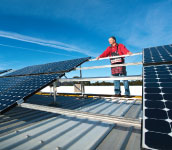
The solar panel system on the roof of the Belconnen warehouse in the ACT. We have installed micro-generation demonstration projects to gain a better understanding of current technologies and their future potential to reduce electricity related greenhouse gas emissions.
Governance
We are not aware of any potential non-compliance during the year with licensing or approval conditions except as set out below.
The Department of Primary Industries instigated proceedings against Bunnings for the alleged sale of Mexican Feather Grass in 2008. In July 2010 Bunnings received a non-conviction relating to these charges.
We received nine improvement notices from work health authorities relating to dangerous goods storage, safety signage and mobile plant inspections. All issues were rectified and the notices closed off in agreed timeframes.
Community
Actively participating in the local communities in which we operate is integral to all of Bunnings’ community involvement activities. Bunnings contributes to a diverse range of local, regional and national causes in Australia and New Zealand and we continue to embrace the ‘we live here too’ philosophy throughout our team.
During 2010 we furthered our work with schools, conducting 573 sustainability school program activities. We also supported Schools Tree Day for the second consecutive year through a native tube stock planting activity with local students, and we undertook an additional program with Green Up Clean Up, which includes locally-driven planting and clean up activities. We also supported Firestarter Youth Environment Conferences as the environmental project day partner for the third year by providing materials and hands on native bird box building workshops.
Our Australian and New Zealand teams supported more than 33,000 community activities through fundraising sausage sizzles, hands on DIY projects and renovations, local fundraising activities, community workshops and more. Our support included active team member support, product contributions and financial assistance.
In Australia, Bunnings supported a number of organisations through locally driven, store run activities. These included Prostate Cancer Foundation of Australia, White Ribbon Day, Scouts Australia and RSPCA (WA), local emergency services, RSL, Legacy, Lions and Rotary groups, Meals on Wheels and the CWA.
New Zealand support included the Big Night In for KidsCan StandTall charitable trust, Shave for a Cure with the Leukaemia and Blood Foundations, Heart Stopper Challenge for Heart Children, and active support of Keep New Zealand Beautiful Clean Up Week.
Additionally, our emergency response efforts included supporting the bushfire affected families in Toodyay, WA. Our Qld teams provided relief efforts for Cyclone Ului by contributing supplies to local community and emergency groups in the regions worst affected by the cyclone in March 2010.
Bunnings is committed to an ongoing, active and engaging role within each of our local communities. We are proud to have assisted in local community activities in 2009/10 which raised more than $20 million and were as diverse as fundraising sausage sizzles to hands on, DIY projects and renovations.
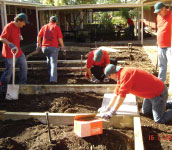
Community involvement
Our community involvement began in 1994 when the Sunshine team built a kids playground as part of our first store opening celebrations. Over the past 16 years this commitment has grown to include fundraising sausage sizzles at every store, financial assistance for not-for-profit groups, product donations, and active team member assistance with local community projects.
Our ability to respond immediately to disasters through our store teams has also allowed us to offer support to victims of the Black Saturday bushfires in Vic (2009), Cyclone Nargis (2008), Toodyay (WA) bushfires (2010) and the Newcastle (2007) and Mackay floods (2010). During 2010 our team participated in more than 33,000 community activities and contributed and helped raise more than $20 million.
Economic investment
During the year our capital expenditure projects invested more than $411.5 million dollars in local economies through development and expansion activities that included the opening of 11 new warehouse stores, two smaller format stores and nine trade centres. Our total trading revenue for the year increased by 10.2 per cent to $6.4 billion. Our total earnings before interest and tax increased by 10.5 per cent to $728 million.
For further details on our sustainability performance please go to our sustainability report at www.bunnings.com.au and www.bunnings.co.nz

